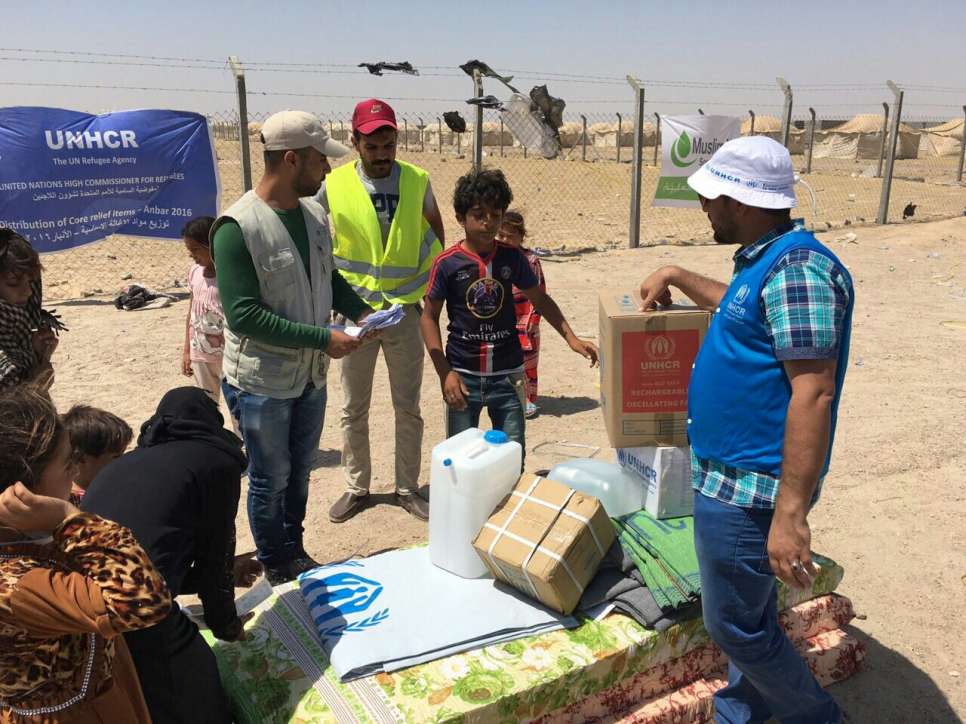Thousands of civilians flee raging battle for Falluja
Reports of ISIL using civilians as human shields in the besieged Iraqi city, as the number of civilians who have escaped reaches 3,700.

UNHCR staff distribute emergency aid to newly-displaced families from Falluja at al-Iraq camp, Ameriyat Al-Fallujah, Anbar, Iraq. © UNHCR/Anmar Qusay
BAGHDAD, May 31 (UNHCR) – The number of Iraqis who have escaped the besieged city of Falluja his risen to around 3,700, the UN Refugee Agency said today, noting reports that hundreds of families still trapped in the city are being used by ISIL militants as human shields.
Falluja, which lies around 60 kilometres west of the capital, Baghdad, was the first Iraqi city to be taken by ISIL in a January 2014 offensive. Since then, more than 3.2 million people have been displaced across Iraq.
UNHCR spokesperson William Spindler told a news briefing in Geneva on Tuesday (May 31) that around 3,700 people – 624 families – have fled Falluja since the new offensive by Iraqi forces to retake the city began last week, according to figures provided by authorities.
About 1,300 of those people are staying in al-Iraq camp in the Amiriyat al-Falluja district in Anbar governorate, where UNHCR is working. Others are scattered in one of several other Government-run camps in the district or are staying with relatives.
Spindler noted that Iraqi forces are helping to transport families escaping the city, and have set up a hotline (195) to provide information to people wanting to leave.
“UNHCR understands approximately 500 men and boys over 12 years old are held for security screening which can take five to seven days. People are being released after this process, and we understand some 27 men were released yesterday (Monday 30 May),” he told reporters at the Palais des Nations.
Between 40,000 and 50,000 civilians still remain trapped inside in Falluja, prevented from escaping by militants as the city continues to come under heavy bombardment by Iraqi forces. In December, routes out of the city were cut off and civilians prevented from leaving.
"There are reports of several hundred families being used as human shields by ISIL in the centre of Falluja."
“UNHCR has received reports of casualties among civilians in Falluja city centre due to heavy shelling, including seven members of one family on May 28. There are also reports of several hundred families being used as human shields by ISIL in the centre of Falluja,” Spindler said.
Conditions for those trapped in the city are dire. UNHCR previously noted reports of several starvation-related deaths amid food shortages. Families have had to rely on unsafe water sources, including drainage water from irrigation canals. Health facilities and medications are unavailable.
UNHCR and its partner, Muslim Aid, are distributing emergency relief items to families who have escaped the city and are sheltering at Amiriyat al-Falluja. The agency will also open two new camps in coming days in Habbaniyah Tourist City, that will able to accommodate 500 newly-displaced families.
Falluja is one of two remaining strongholds held by ISIL, the other being Mosul, Iraq’s country’s second city. For the past few weeks, there has been intensified fighting around Falluja and airstrikes by coalition forces as the Iraqi Security Forces advanced towards the city.
Families that escaped have told UNHCR and its protection partners harrowing tales of their flight, trekking for hours at night, moving across fields and hiding in disused irrigation pipes. Others have lost their lives trying to leave the city, including women and children.
Inside Falluja, there have been reports of a dramatic increase in the number of executions of men and older boys for refusing to fight on behalf of ISIL. Other reports say a number of people attempting to leave have been executed or whipped, and one man’s leg was reportedly amputated.
In addition, many people are reported to have been killed or buried alive under the rubble of their homes in the course of ongoing military operations.
UNHCR has said it is vital that safe routes are opened, allowing civilians access to safety and live-saving assistance.
For more information, see our related briefing note.
